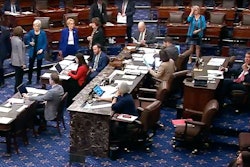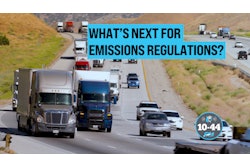The California Air Resources Board believes the Clean Truck Partnership (CTP) it signed with all the major North American heavy truck OEMs in 2023 is legally binding, and so does the man who authored many of the terms of the agreement.
Craig Segall, who helped write the Advanced Clean Trucks (ACT) rules while working as Deputy Executive Officer at CARB, said he believes the OEMs remain bound by the CTP that he helped negotiate. He points to their agreement to meet “relevant provisions of the CARB regulations” as set out in this paragraph: The OEMs commit to meet, in California, the relevant provisions of the CARB regulations set forth in Appendices A and B, and any agreed upon modifications to such regulations as set forth in this agreement, irrespective of the outcome of any litigation challenging the waivers or authorizations for those regulations or of CARB’s overall authority to implement those regulations.
The sticking point in the 16 page document seems to be a single word – "litigation"– and it looms large in what could be a protracted discussion of semantics and debate over how heavy truck sales in The Golden State will be handled now that the waivers that enacted ACT and CARB's Omnibus regulations have been revoked by Congress.
"The agreement says they agree to abide regardless of the outcome of litigation. Litigation is not the issue," Clean Freight Coalition Executive Director Jim Mullen told CCJ last week. "What's the issue is Congress said 'You don't have a waiver anymore,' therefore, there's no waiver. I think they wish they had written it differently, but the fact of the matter is they didn't. The words matter."
Words matter and so does punctuation, according to Segall, who contends the tactical placement of a comma on Appendix B covers regulatory action like Congressional revocation.
... regardless of the outcome of any litigation challenging the waivers/authorizations for those regulations, or CARB’s overall authority to implement those regulations.
"I know how it was intended to be read and it is pretty clear that there were two things we got covered there," he said. "They're set off in separate clauses of the agreement. If some litigation happens, we're still going forward. If CARB's authority changes, we're still going forward."
Passed by Congress last month, Joint Resolutions 87 and 89 each formally provide congressional disapproval under chapter 8 of title 5, United States Code, of the rules submitted by the Environmental Protection Agency relating to California Truck Emission Standards (CARB's Omnibus rule) and California Truck NOx Emission Standards (CARB's Advanced Clean Trucks regulations), respectively.
Given that CARB regulations are routinely challenged, Segall said the agency wouldn't have omitted language from the CTP that didn't address that as a possibility.
"If you think about the context here, CARB's has been through a range of authority lawsuits already," he noted. "We saw that during (the first Trump administration). Waivers get pulled. It wasn't like the people who were making the deal hadn't thought about these other possibilities."
Too, if the validity of the deal hinges on litigation, Segall noted California Gov. Gavin Newsom and Attorney General Rob Bonta already intend to file a lawsuit in an effort to block the Congress Review Acts (CRA) from taking the state’s ability to set its own emission rules and overturning the rules already enacted.
"There's still litigation. The states are suing over the CRAs," he said. "I don't see why that litigation wouldn't matter as much as any other kind of litigation... I really don't think there's an argument that (the CTP) just somehow goes away."
Caught in the crossfire are the OEMs who signed the deal originally and now don't have a lot of clarity in how to sell trucks in California.
Mack and Volvo Trucks parent Volvo Group Senior Vice President of Corporate Communications John Mies told CCJ last week his company intends to keep its sales policies in California "as they are for now."
The wait and see approach seems to be the popular (if not only) option for truck and engine manufacturers and dealers, at least in the near-term.
"The dust hasn’t quite settled," Brian Tabel, Isuzu Commercial Trucks, Americas assistant vice president of marketing told CCJ. "We anticipate a good faith discussion with CARB and other regulated signatories to determine the agreement’s current scope and relevance."
A spokesperson for Daimler Truck North America said the company was "closely monitoring the developments surrounding H.J.Res. 87 and 89 and will evaluate the implications of these resolutions as they progress."
'Not a gotcha deal'
Segall, who was critical of the OEMs when Congress voted to kill CARB's clean trucks rules last month, added that the terms of the CTP benefits truck and engine manufacturers as much as it does California air quality.
"It's not a gotcha deal. It was intended to provide everyone certainty going forward for product planning for five to 10 years," he said. "It would be really surprising if folks had entered into this deal assuming that there's these weird little bending reach around ways to read (the CTP) to then self-destruct all product planning and market development."
Mack and Volvo Trucks are already seeking engine certification for CARB's 2024 Omnibus requirements for low nitrogen oxide and particulate matter emissions standards, and Paccar has had a low-NOx MX-13 on the market for almost a year.
The CRAs do not revoke CARB's authority to enact future emissions regulations as long as those new rules are not substantially the same as those that were included in the now-revoked ACT and Omnibus rules. Segall said the CTP, in that regard, offers OEMs some measure of protection.
"If you insist (the CTP) doesn't apply, the OEMs once again are rejiggering billions of dollars in production decisions and manufacturing and they might be getting that wrong," Segall said. "Anything that CARB comes up with for (model year 2028 and 2029) is going to be pretty different: different production timelines, different engine costs, different curves... it'll be quite a different system. But what you're basically throwing away if or when you choose to challenge (the CTP) is a pretty hefty degree of certainty that you can't get back."











